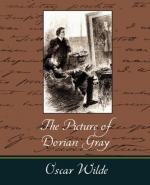For there would be a real pleasure in watching it. He would be able to follow his mind into its secret places. This portrait would be to him the most magical of mirrors. As it had revealed to him his own body, so it would reveal to him his own soul. And when winter came upon it, he would still be standing where spring trembles on the verge of summer. When the blood crept from its face, and left behind a pallid mask of chalk with leaden eyes, he would keep the glamour of boyhood. Not one blossom of his loveliness would ever fade. Not one pulse of his life would ever weaken. Like the gods of the Greeks, he would be strong, and fleet, and joyous. What did it matter what happened to the coloured image on the canvas? He would be safe. That was everything.
He drew the screen back into its former place in front of the picture, smiling as he did so, and passed into his bedroom, where his valet was already waiting for him. An hour later he was at the opera, and Lord Henry was leaning over his chair.
CHAPTER 9
As he was sitting at breakfast next morning, Basil Hallward was shown into the room.
“I am so glad I have found you, Dorian,” he said gravely. “I called last night, and they told me you were at the opera. Of course, I knew that was impossible. But I wish you had left word where you had really gone to. I passed a dreadful evening, half afraid that one tragedy might be followed by another. I think you might have telegraphed for me when you heard of it first. I read of it quite by chance in a late edition of The Globe that I picked up at the club. I came here at once and was miserable at not finding you. I can’t tell you how heart-broken I am about the whole thing. I know what you must suffer. But where were you? Did you go down and see the girl’s mother? For a moment I thought of following you there. They gave the address in the paper. Somewhere in the Euston Road, isn’t it? But I was afraid of intruding upon a sorrow that I could not lighten. Poor woman! What a state she must be in! And her only child, too! What did she say about it all?”
“My dear Basil, how do I know?” murmured Dorian Gray, sipping some pale-yellow wine from a delicate, gold-beaded bubble of Venetian glass and looking dreadfully bored. “I was at the opera. You should have come on there. I met Lady Gwendolen, Harry’s sister, for the first time. We were in her box. She is perfectly charming; and Patti sang divinely. Don’t talk about horrid subjects. If one doesn’t talk about a thing, it has never happened. It is simply expression, as Harry says, that gives reality to things. I may mention that she was not the woman’s only child. There is a son, a charming fellow, I believe. But he is not on the stage. He is a sailor, or something. And now, tell me about yourself and what you are painting.”
“You went to the opera?” said Hallward, speaking very slowly and with a strained touch of pain in his voice. “You went to the opera while Sibyl Vane was lying dead in some sordid lodging? You can talk to me of other women being charming, and of Patti singing divinely, before the girl you loved has even the quiet of a grave to sleep in? Why, man, there are horrors in store for that little white body of hers!”




